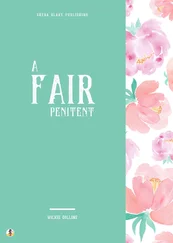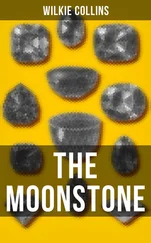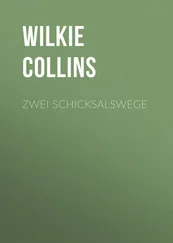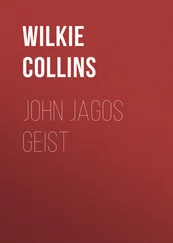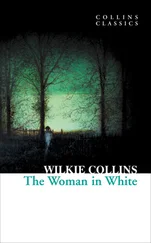Wilkie Collins - The Moonstone
Здесь есть возможность читать онлайн «Wilkie Collins - The Moonstone» — ознакомительный отрывок электронной книги совершенно бесплатно, а после прочтения отрывка купить полную версию. В некоторых случаях можно слушать аудио, скачать через торрент в формате fb2 и присутствует краткое содержание. Год выпуска: 2006, Жанр: Классическая проза, на английском языке. Описание произведения, (предисловие) а так же отзывы посетителей доступны на портале библиотеки ЛибКат.
- Название:The Moonstone
- Автор:
- Жанр:
- Год:2006
- ISBN:нет данных
- Рейтинг книги:4 / 5. Голосов: 1
-
Избранное:Добавить в избранное
- Отзывы:
-
Ваша оценка:
- 80
- 1
- 2
- 3
- 4
- 5
The Moonstone: краткое содержание, описание и аннотация
Предлагаем к чтению аннотацию, описание, краткое содержание или предисловие (зависит от того, что написал сам автор книги «The Moonstone»). Если вы не нашли необходимую информацию о книге — напишите в комментариях, мы постараемся отыскать её.
The Moonstone — читать онлайн ознакомительный отрывок
Ниже представлен текст книги, разбитый по страницам. Система сохранения места последней прочитанной страницы, позволяет с удобством читать онлайн бесплатно книгу «The Moonstone», без необходимости каждый раз заново искать на чём Вы остановились. Поставьте закладку, и сможете в любой момент перейти на страницу, на которой закончили чтение.
Интервал:
Закладка:
There are two requests contained in the letter. One of them prevents me from showing it to Mr. Franklin Blake. I am authorised to tell him that Miss Verinder willingly consents to place her house at our disposal; and, that said, I am desired to add no more.
So far, it is easy to comply with her wishes. But the second request embarrasses me seriously.
Not content with having written to Mr. Betteredge, instructing him to carry out whatever directions I may have to give, Miss Verinder asks leave to assist me, by personally superintending the restoration of her own sitting-room. She only waits a word of reply from me to make the journey to Yorkshire, and to be present as one of the witnesses on the night when the opium is tried for the second time.
Here, again, there is a motive under the surface; and, here again, I fancy that I can find it out.
What she has forbidden me to tell Mr. Franklin Blake, she is (as I interpret it) eager to tell him with her own lips, BEFORE he is put to the test which is to vindicate his character in the eyes of other people. I understand and admire this generous anxiety to acquit him, without waiting until his innocence may, or may not, be proved. It is the atonement that she is longing to make, poor girl, after having innocently and inevitably wronged him. But the thing cannot be done. I have no sort of doubt that the agitation which a meeting between them would produce on both sides—reviving dormant feelings, appealing to old memories, awakening new hopes—would, in their effect on the mind of Mr. Blake, be almost certainly fatal to the success of our experiment. It is hard enough, as things are, to reproduce in him the conditions as they existed, or nearly as they existed, last year. With new interests and new emotions to agitate him, the attempt would be simply useless.
And yet, knowing this, I cannot find it in my heart to disappoint her. I must try if I can discover some new arrangement, before post-time, which will allow me to say Yes to Miss Verinder, without damage to the service which I have bound myself to render to Mr. Franklin Blake.
Two o’clock.—I have just returned from my round of medical visits; having begun, of course, by calling at the hotel.
Mr. Blake’s report of the night is the same as before. He has had some intervals of broken sleep, and no more. But he feels it less to-day, having slept after yesterday’s dinner. This after-dinner sleep is the result, no doubt, of the ride which I advised him to take. I fear I shall have to curtail his restorative exercise in the fresh air. He must not be too well; he must not be too ill. It is a case (as a sailor would say) of very fine steering.
He has not heard yet from Mr. Bruff. I found him eager to know if I had received any answer from Miss Verinder.
I told him exactly what I was permitted to tell, and no more. It was quite needless to invent excuses for not showing him the letter. He told me bitterly enough, poor fellow, that he understood the delicacy which disinclined me to produce it. “She consents, of course, as a matter of common courtesy and common justice,” he said. “But she keeps her own opinion of me, and waits to see the result.” I was sorely tempted to hint that he was now wronging her as she had wronged him. On reflection, I shrank from forestalling her in the double luxury of surprising and forgiving him.
My visit was a very short one. After the experience of the other night, I have been compelled once more to give up my dose of opium. As a necessary result, the agony of the disease that is in me has got the upper hand again. I felt the attack coming on, and left abruptly, so as not to alarm or distress him. It only lasted a quarter of an hour this time, and it left me strength enough to go on with my work.
Five o’clock.—I have written my reply to Miss Verinder.
The arrangement I have proposed reconciles the interests on both sides, if she will only consent to it. After first stating the objections that there are to a meeting between Mr. Blake and herself, before the experiment is tried, I have suggested that she should so time her journey as to arrive at the house privately, on the evening when we make the attempt. Travelling by the afternoon train from London, she would delay her arrival until nine o’clock. At that hour, I have undertaken to see Mr. Blake safely into his bedchamber; and so to leave Miss Verinder free to occupy her own rooms until the time comes for administering the laudanum. When that has been done, there can be no objection to her watching the result, with the rest of us. On the next morning, she shall show Mr. Blake (if she likes) her correspondence with me, and shall satisfy him in that way that he was acquitted in her estimation, before the question of his innocence was put to the proof.
In that sense, I have written to her. This is all that I can do to-day. To-morrow I must see Mr. Betteredge, and give the necessary directions for reopening the house.
June 18th.—Late again, in calling on Mr. Franklin Blake. More of that horrible pain in the early morning; followed, this time, by complete prostration, for some hours. I foresee, in spite of the penalties which it exacts from me, that I shall have to return to the opium for the hundredth time. If I had only myself to think of, I should prefer the sharp pains to the frightful dreams. But the physical suffering exhausts me. If I let myself sink, it may end in my becoming useless to Mr. Blake at the time when he wants me most.
It was nearly one o’clock before I could get to the hotel to-day. The visit, even in my shattered condition, proved to be a most amusing one—thanks entirely to the presence on the scene of Gabriel Betteredge.
I found him in the room, when I went in. He withdrew to the window and looked out, while I put my first customary question to my patient. Mr. Blake had slept badly again, and he felt the loss of rest this morning more than he had felt it yet.
I asked next if he had heard from Mr. Bruff.
A letter had reached him that morning. Mr. Bruff expressed the strongest disapproval of the course which his friend and client was taking under my advice. It was mischievous—for it excited hopes that might never be realised. It was quite unintelligible to HIS mind, except that it looked like a piece of trickery, akin to the trickery of mesmerism, clairvoyance, and the like. It unsettled Miss Verinder’s house, and it would end in unsettling Miss Verinder herself. He had put the case (without mentioning names) to an eminent physician; and the eminent physician had smiled, had shaken his head, and had said—nothing. On these grounds, Mr. Bruff entered his protest, and left it there.
My next inquiry related to the subject of the Diamond. Had the lawyer produced any evidence to prove that the jewel was in London?
No, the lawyer had simply declined to discuss the question. He was himself satisfied that the Moonstone had been pledged to Mr. Luker. His eminent absent friend, Mr. Murthwaite (whose consummate knowledge of the Indian character no one could deny), was satisfied also. Under these circumstances, and with the many demands already made on him, he must decline entering into any disputes on the subject of evidence. Time would show; and Mr. Bruff was willing to wait for time.
It was quite plain—even if Mr. Blake had not made it plainer still by reporting the substance of the letter, instead of reading what was actually written—that distrust of me was at the bottom of all this. Having myself foreseen that result, I was neither mortified nor surprised. I asked Mr. Blake if his friend’s protest had shaken him. He answered emphatically, that it had not produced the slightest effect on his mind. I was free after that to dismiss Mr. Bruff from consideration—and I did dismiss him accordingly.
A pause in the talk between us, followed—and Gabriel Betteredge came out from his retirement at the window.
Читать дальшеИнтервал:
Закладка:
Похожие книги на «The Moonstone»
Представляем Вашему вниманию похожие книги на «The Moonstone» списком для выбора. Мы отобрали схожую по названию и смыслу литературу в надежде предоставить читателям больше вариантов отыскать новые, интересные, ещё непрочитанные произведения.
Обсуждение, отзывы о книге «The Moonstone» и просто собственные мнения читателей. Оставьте ваши комментарии, напишите, что Вы думаете о произведении, его смысле или главных героях. Укажите что конкретно понравилось, а что нет, и почему Вы так считаете.






